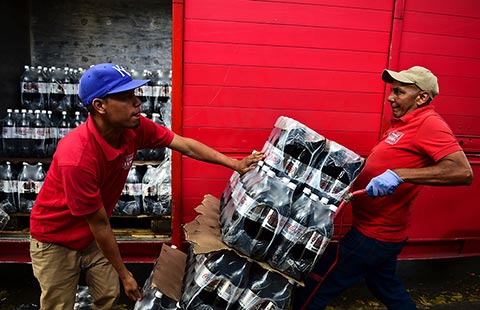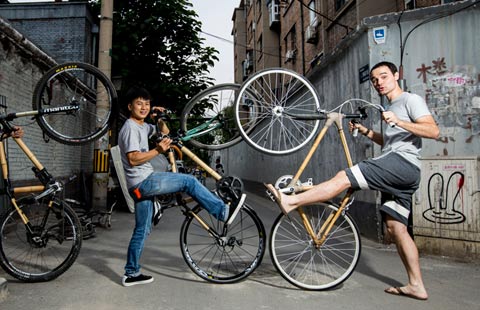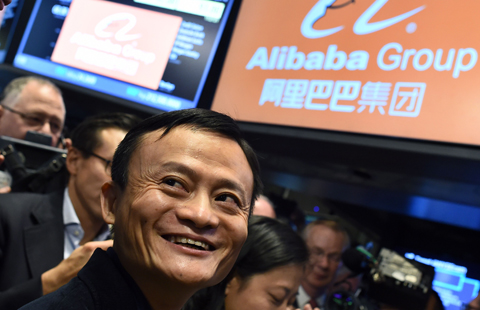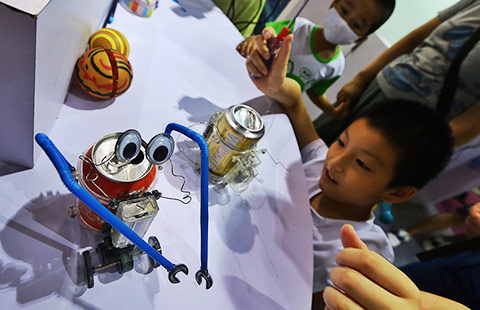Intelligent plant to meet demand for robot parts
By Liu Weifeng (China Daily) Updated: 2016-07-20 08:03
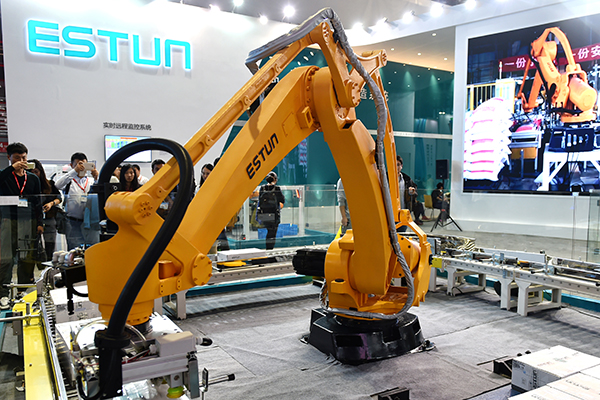 |
|
A versatile six-axis articulated robot, developed by Estun Automation Co Ltd, on display at an industrial expo in Shanghai last year. [Photo/China Daily] |
Nanjing-based Estun Automation expands its robot-building and research capacity
Nanjing-based Estun Automation Group, a leading Chinese maker of robot key parts and intelligent equipment, will see its production capacity expand substantially with the setting up of a sizeable smart factory next month.
Construction of a 20,000-square-meter facility is scheduled to complete by August, with operations starting by the year-end.
The facility is designed with an annual production capacity of 15,000 robots and pieces of equipment. Sales are projected to reach more than 1 billion yuan ($151.5 million) after the completion of the 120,000-sqm project by 2018.
It includes an 80,000-sqm R&D center, scheduled to come up next year.
"We are proud of our self-researched key components, including speed reducers, drive and control devices, as well as servomotors, which are all key strengths of Estun," said Jack Wang, chief engineer of Estun Automation, and general manager of subsidiary Estun Robotics Co Ltd.
"The biggest advantage of our R&D capability is lower cost, which lays a solid foundation for intelligent manufacturing on a mass scale."
The robot-heavy manufacturing unit in Jiangning High-Tech Zone in Nanjing, Jiangsu province, will be in line with the government's "Made in China 2025" strategy that underlines innovation and upgradation.
China is aiming at an annual output of 100,000 industrial robots by 2020, according to a plan issued in April by the Ministry of Industry and Information Technology .
That target was set to spur the "Industrial 4.0" strategy to make the country's manufacturing smarter, safer and more flexible.
The Estun smart factory project is geared to meet the rising demand for robot parts and intelligent equipment from domestic and overseas markets.
The investment is in tune with the country's stress on raising companies' localization rate in terms of key parts and components and enhancing the competitive edge of robots developed indigenously.
A robotics R&D veteran with more than 25 years of experience, Wang was part of the team that built robots for the International Space Station and service satellites.
He is a member of an expert committee of the China Robot Industry Alliance. He is also on the executive board of the International Federation of Robotics.
"Nanjing's twin advantages lie in its talent and location. Both could help the city to innovate and upgrade," said Huang Lixin, Party chief of Nanjing.
"Nanjing is aligned with all the key national strategies like the Silk Road Economic Belt, the Yangtze River Delta city cluster and the Belt and Road Initiative."
Estun Automation Co Ltd, the Hong Kong-listed arm of the group, earned 485.22 million yuan in revenue in 2015, and 96 million yuan in the first quarter of this year.
It bought an automation system firm for 76 million yuan from Hong Kong's L.K. Machinery on June 28, which will strengthen Estun's capacity and market share in the automation field.
Zheng Mingang, an analyst at Dongxing Securities, forecast that the company's revenue for 2016-18 would reach 594 million yuan, 761 million yuan and 1.04 billion yuan respectively.
Estun entered the robot business in 2011, and started to sell robots in 2013. It has grown robustly, riding the wave of industrial transformation in China. Its current annual output is over 1,000 units, mostly sold domestically.
Its three overseas subsidiaries, in the Middle East, Europe and South America, mainly sell its key components.
Overseas markets contribute around 20 percent of Estun's annual sales. It could double in a few years on the back of the good quality and competitive prices of its products, said the company.
- Another winner from Hangzhou
- China Telecom eyes Egypt 4G licenses
- BRICS bank issues RMB green bonds
- SOE reform includes mixed ownership model
- Philippine trade 'not affected by dispute'
- Fischer hopes fixings to be fixed fixture in China
- Alibaba opens new office in Australia to push globalization strategy
- China suffers from increased protectionist measures

